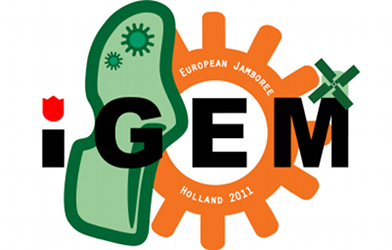Team:TU-Delft/TestJamboree/SponsorInfomation
From 2011.igem.org

 |  | 
|
iGEM competition
iGEM is the highly successful yearly international competition for Genetically Engineered Machines. Interdisciplinary teams of highly motivated and bright undergraduate students design and build biological nanomachines during the summer. These nanomachines are tailored to carry out tasks in, medical diagnostics, removal of pollutants or biofuel production. During the final jamboree at the Massachusetts Institute of Technology (MIT) in Boston, the best projects are awarded.
Since 2003, over 400 projects have been presented. Last year 124 teams competed at the Jamboree in Boston, and iGEM is still growing, worldwide. To accommodate the spectacular growth in the number of participating teams, iGEM Headquarters have initiated regional iGEM competitions for 2011. America, Asia and Europe will select the best teams for the upcoming iGEM worldchampionship in Boston. Universities in the Netherlands were selected to organize the first European Jamboree in Amsterdam in October 2011.
Jamboree
The iGEM Jamboree attracts a large number of senior and young scientists; For the Europe regional event we expect about 500 students and 100 supervisors and judges. This is a significant opportunity for your organization to create visibility and collaborate with the current and future European leaders in the new field of Synthetic Biology. You will support science and education in a motivating manner - iGEM has been growing every year due to its highly inspiring educational and scientific concepts. iGEM headquarters is a non-profit organization.
The teams
Since 2003, the iGEM competition encourages undergraduate teams from all over the world to develop a project that intertwines the principles of Molecular Biology and Engineering. During summer the project is designed and taken into function in the lab. Synthetic Biology is an interdisciplinary approach – methods from molecular biology, systems biology, control theory, engineering and biotechnology are integrated. In practice, teams work on plasmid construction, assay development and modelling and construction of genetic circuits, metabolic and signal transduction pathways. Because of the expected impact of Synthetic Biology in fields like sustainable bioproducts, new biofuels, medical treatments and environmental technologies the teams also evaluate the social, economic and environmental impact of their project. The teams inform the general public about these technologies in workshops, videos and information in the web. The societal value of projects is therefore not solely based on scientific merit, but also on their social, economic and environmental impact. The teams consisting mainly of undergraduate students in biology, biochemistry, engineering, informatics and mathematics, carry out different projects at their own universities during the summer. They are advised and assisted by teams of scientists.
Standardized Biology - BioBrick
Synthetic Biology is an emerging research area that applies engineering principles to biological systems. Especially the automated synthesis of genetic material (DNA) up to the size of bacterial chromosomes enables the design of new biological functions.
The basic idea of synthetic biology is to (1) design genetic circuits i.e. sets of interacting genes performing some desired task and to (2) insert the designed circuit into living cells, thus creating cells with new function. The iGEM organization standard for plasmid construction, the BioBrick specification enables an easy exchange and ligation of coding DNA fragments. iGEM Headquarters harbor a large collection of BioBricks that are available to the teams (distribution plate).
Education
Students participating in the iGEM competition develop skills in creativity, team spirit, communication and organization. The members of the team commonly have very different backgrounds ranging from molecular biology, (bio-)chemistry, physics, informatics, mathematics, social sciences to medicine and pharmacy. Working in such an interdisciplinary team broadens the knowledge and trains the ability to cooperate, explain and teach each other in a complex organization. For a team to choose an appealing and feasible project, a phase of brainstorming, preparation, analysis, discussions and prioritizing takes place. The students involve specific scientific advisors and instructors from their university. In many universities iGEM has been embedded in the curriculum. The students can enroll in a dedicated iGEM master course with about 18 ECTS. The students mention as major learning achievements: designing of their own project, planning and decision making, increasing teaching skills, organization of team work, fund raising, presenting of results, use of computational tools and communication with different bodies like industry, press, and the general public. The universities see a great benefit in participation in the iGEM competition. Students become highly motivated for Synthetic Biology and science in general. They communicate with different instructors and foster the interdisciplinary research at universities. Also, staff members from different faculties build networks for recruiting and supervising iGEM teams, thus facilitating the communication between faculties. Additionally, many of the former iGEM students choose a career in science and start PhD projects. iGEM has a lot to offer to students and has a huge impact on academic research in life sciences.
 "
"